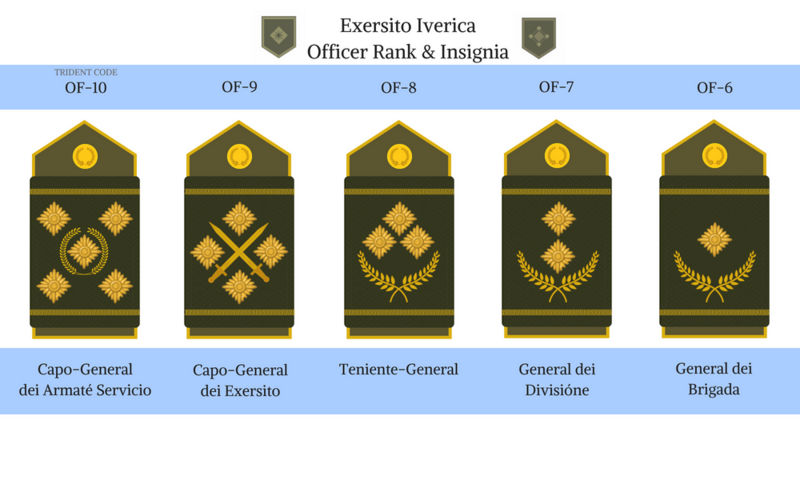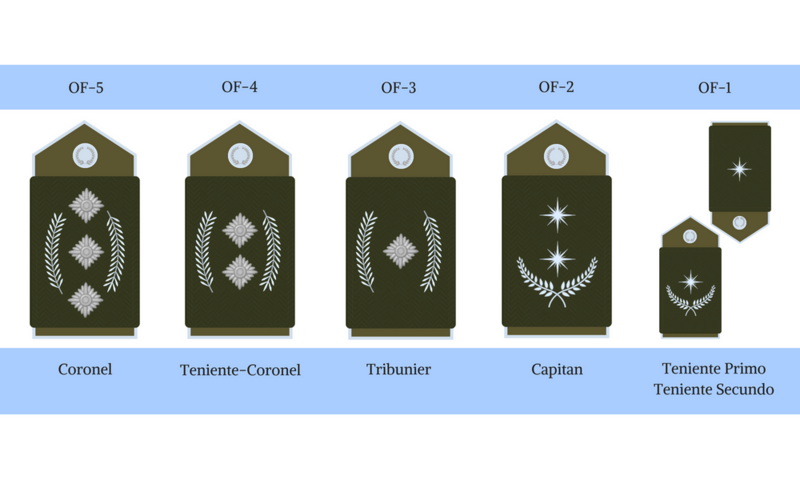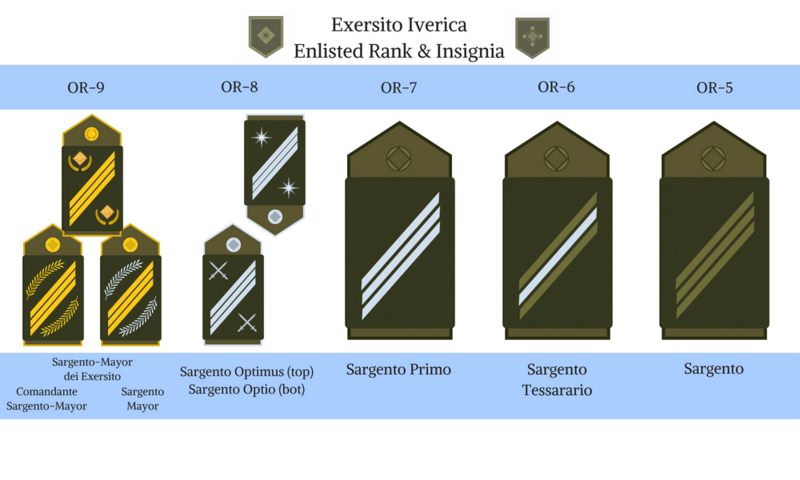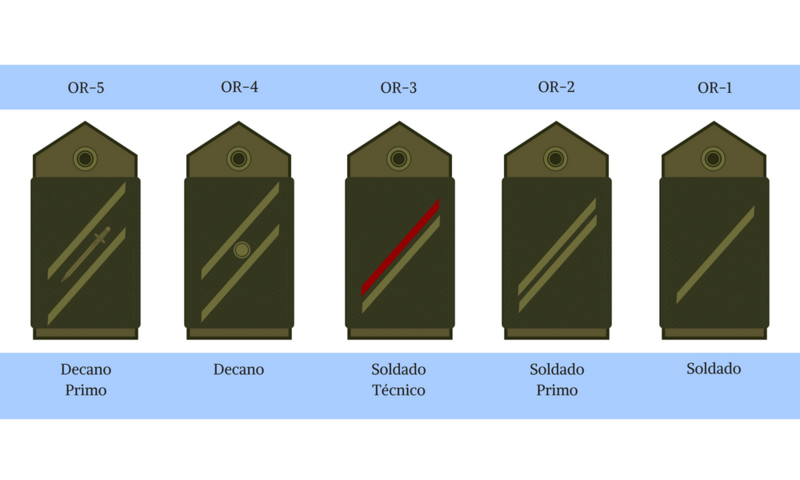Iverican Army
This article is incomplete because it is pending further input from participants, or it is a work-in-progress by one author. Please comment on this article's talk page to share your input, comments and questions. Note: To contribute to this article, you may need to seek help from the author(s) of this page. |
| Army of the Republic of Iverica | |
|---|---|
| Exersito D'República Iverica | |
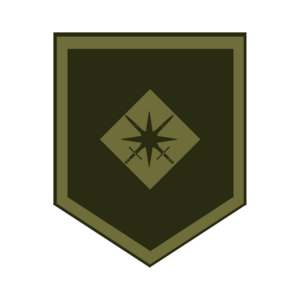 | |
| Active | 1620 (as the Guardia Expediciónare) 1650 (as the Guardia Peninsulares) 1820-Present (as the Exersito Iverica) |
| Country | Republic of Iverica |
| Type | Army |
| Role | Land Warfare |
| Size | 235,000 Regular Personnel 60,000 Irregular Reserves |
| Garrison/HQ | Corregidor Comande Tierra |
| Patron | St. Ignacio |
| Motto(s) | Noli Me Tangere (Aroman)
"Touch Me Not" |
| March | Avanto, Fusilieri! |
| Mascot(s) | Argic Ram |
| Engagements | Peninsular Conquest (1620-1650) Iverican Civil War (1740-1746) Thalassan War First Argic War Second Argic War Vasqqan Civil Wars Operation Ultra Violet |
| Commanders | |
| Capo-General dei Exersito | CGE Javier Vittorio |
| Sargento Mayor dei Exersito | SME Miquel Valderamma |
| Notable commanders | TRG Anton Luna GB Gregorio Del Pilar |
The Exersito Iverica (EXIV) is the ground-warfare branch of the Republican Armed Service with 235,000 enlisted personnel divided into administrative divisions, mission brigade groups, and combat regiment teams. Around 95,000 of the Exersito regular personnel serve support roles, while the rest are considered combat servicepersons.
The Exersito's primary duties include the defence of the Iverican Homeland, garrison of structures and points in land-based objectives, construction of field facilities and equipment, logistical efforts and security in land deployment, peacekeeping and relief efforts.
Mission
The Exersito Iverica's mission is to preserve the peace and security while providing a defensive force for the people of the Republic. The Exersito must uphold, defend, and protect the provisions of the Consitution and any sovereign holdings of the Republic while also seeking to overcome the force of any nation acting in aggression to imperil the lives and peace of the Republic's citizenry and entities.
Supplementarily, the Exersito must support national policies and if deemed necessary, assist in implementing these policies in order to achieve national objectives.
Doctrine
The combat doctrine of the Exercito is heavily focused on manoeuver warfare, hit-and-fade tactics, and defensive strategy. It employs great cooperation with the Air Force and utilisation of its elite mountain and airborne brigades to create a highly manoeuvrable, decentralised force capable of quick-response, supply disruption, and surprise assault.
Much of this ability is a result of prepared infrastructure, well-surveyed ingress and egress routes, secure decentralised supply, a heavy training focus on disciplined communications, and a well-practised rapid response procedure. All infantry units in Airevieri (Airborne) and Alpinieri (Mountain) brigades are certified with at least 10 jumps (16 for Airborne) before graduation and are trained in motorised and mechanised deployment. Regular forces are expected to supplement this by clearing airspace, land/water routes, securing supply, laying support structures, defensive structures or obstacles to delay an enemy force. In a defensive scenario, small unit bases such as dirt airfields, hidden munitions depots and mountain facilities work in tandem with this speciality. Air Force and Exersito equipment are created and selected specifically to work with short, dirt airfields, cramped interiors, tight or unpaved roads, and hostile weather.
Apart from a flexible corps of trained soldiers, the Exersito also maintains fixed strong-points designed to act as foils and obstacles for an overwhelming enemy force. Certain units specialise in entrenchment and static defensive operations to deny enemy movement and slow major offensives.
Overall, the doctrine ensures maximum use of Iverican geography, transport infrastructure and combined arms efforts to create a framework for effective and efficient asymmetrical defence of the home territories.
Organisation
Brigadier System
Pre-Grand War
The Exersito borrows its system of organisation from both regimental and continental systems. It has been nicknamed the, Brigadier system, where the functional unit is the brigade rather than individual regiments or the whole division.
The system was necessitated by the Exersito's doctrinal context. First, Iverica maintains nuanced and somewhat insular regional cultures. The cross-integrating troops from different localities as in the continental system would be detrimental to esprit de corps. Furthermore, The Exersito's doctrinal goal is the defence of the peninsular home territories, against an invasion that will likely be massed landings of troops--a situation of such scale that the regimental system would be poorly adapted to.
The brigadier system adopts the isolated recruiting, formation, and administration as in the regimental system, but does so in the scale of a brigade rather than a single regiment. On the other hand, it also adopts the continental system's approach to operations--the brigade's component regiments are not expected to handle operations alone, but rather, they depend on the combined arms capacities of the entire brigade. The result is described in some manuals as a scaled-down continental arrangement wherein each brigade maintains a specific identity and is autonomous enough to carry out its operations without being totally dependent on the support of other brigades.
Corps and Divisions
Pre-Grand War
Corps and Division in the Exersito are administrative and organisational units. This ordering has little bearing in combat operations and exists solely for an ease of top-down administration, oversight, and other management.
From the years 1990-2021, the Exersito Iverica was divided into three Army Corps Commands and further subdivided into individual corps that correspond to an occupational speciality within the Exersito. These Commands are necessary for administering the procurement, storage, and distribution of assets. They also oversee the management of academies and training centres according to specific military occupational speciality.
- Combat Corps Command-composed of the Infantry, Light Infantry, Armoured, Artillery, Air Cavalry Mechanised, Reconnaissance, Airborne, Mountain, Sapper Corps.
- Support Corps Command- composed of the Engineering, Signal, Medical, Exercito Air, Service Electronics, Service Transport, Service Intelligence, and all Reserve Corps.
- Service Support Corps Command- Logistical Corps, Headquarter Corps, Public Relations & Recruitment Corps, and Military Police Corps.
Each Corps is headed by a General dei Divisióne and staff. While they authorise budget requisitions, allocate funds, oversee inventory, and maintain training or instructional oversight. Conversely, the operational command in a theatre of war is always reliant on the Encícomando authorities and field commanders rather than the corps administrative machinery.
Current Organisation
The Exersito currently maintains 2 Army Corps as organisational units, reorganising the system to utilise Divisions as the primary operational component. The 1st-6th Divisions were reorganised in the year 2021 as a response to the Anglian threat to glubal peace. Given the more symmetric and conventional threat posed by the Anglian forces and the Occidental-Azanian Alliance, the 1st-6th divisions were reorganised to operate at their full division strengths rather than operate as independent brigades or modular division task forces made up of composite regiments.
Despite this reorganisation, the 7th Division, Alpinieri and 8th Division, Airevieri remain brigade-centric formations. Similarly, the Exersito's 2 Exepeditionary Deep Strike Regiments remain active and structurally unaffected by the reorganisation. The decision to retain their modularity
Formations
Pre-Grand War Formations
| Formation | Parent Command | Geographies | Headquarters & Barracks | Order of Battle |
|---|---|---|---|---|
| 1st Division of Horse Grenadiers 1er Divisioné Grenadieri a'Caval |
Army Capital Forces Command Exersito Fuersas Comande Capitol |
Nou Tacalonia Capitol District Léon Militarised Zone |
JFS Intreimor (Headquarters) |
|
| 2nd Divison of Horse Grenadiers 2o Divisioné Grenadieri a'Caval |
Army Forces Command West Exersito Fuersas Comande Oeste |
Costa Alba Nou Navaerre Tacalonia Nou Argon |
Forta Providencia (Headquarters) Tacalonia CdE Forta Alba Argon CdE JFS Súbic |
|
| 3rd Division of Cavalry 3er Divisioné dei Cavalieri |
Army Forces Command East Exersito Fuersas Comande Oriens |
Vasqqa D'Oeste Nou Stille Nou Navaerre |
Vasqqa D'Sur CdE (Headquarters) Navaerre CdE Vasqqa D'Norte CdE |
|
| 4th Division of Cavalry 4o Divisioné dei Cavalieri |
Army Forces Command Centre Exersito Fuersas Comande Central |
Léon Aigüestoré |
Léon CdE (Headquarters) JFS Montaco |
|
| 5th Division of Fusiliers 5o Divisioné dei Fusilieri (Half-Strength) |
Army Forces Reserve Command Exersito Fuersas Comande dei Reserva |
--- | --- |
|
| 6th Division of Fusiliers 6o Divisioné dei Fusilieri (Half-Strength) |
Army Forces Reserve Command Exersito Fuersas Comande dei Reserva |
--- | --- |
|
| 7th Division of the Alpinieri | Army Mobile Forces Command Exersito Comande dei Fuersas Móvil |
--- | --- |
|
| 8th Division of the Airevieri | Army Mobile Forces Command Exersito Comande dei Fuersas Móvil |
--- | --- |
|
Division Variants
Horse Grenadiers
Referred to as Grenadieri a'Caval in Iverican. Historically, Horse Grenadier Regiments served in the early-modern period as elite mounted assault troops. In the present, the Regiments that make up the Horse Grenadier Divisions are distinguished by both their historical service records, rigorous training regimen, and draconian disciplinary standards. Units in the Horse Grenadiers are expected to serve as the first resort to Esersito operations. Soldiers that belong to any regiment under a Horse Grenadier Division are issued distinguishing cap-badges and aiguillettes. Along with their combat duties, a member of the Horse Grenadiers is also expected to carry out both ceremonial and practical responsibilities at diplomatic functions, armed forces parades, and state ceremonies.
Cavalry Divisions
Referred to as Divisioné dei Cavalieriin Iverican. Exersito cavalry divisions in the present day serve as an administrative apparatus to efficiently manage manoeuvre units. Specifically, Regiments that rely largely on a pool of rotor, wheeled, and tracked vehicles. Practically, this distinction is redundant as most units in the Exersito Iverica are either motorised, mechanised, or air-mobile in some way; however, the distinction serves to distinguish the regiments that are neither grenadier nor under the reserve command as the rear echelon Carabinieri or motorised infantry.
Fusilier Divisions
Referred to as Divisioné dei Fusilieri in Iverican, Fusiliers divisions are presently infantry divisions whose purpose is almost exclusively domestic defence or (if deployed abroad) rear-guard and garrison. Historically, Fusilier units made up the bulk of Iverican infantry forces. However, after the 1950 Reforms, the classification was redesignated as an administrative apparatus to manage Carabinieri motorised units and regular units of foot.
Bridgade Variants
The majority of Exersito Brigades are composed of single-battalion regiments. Historically, regiments were the primary unit of organisation for the Exersito. However as the Exersito adopted a system relying on combined arms, dependence shifted to Brigades and their subunits: Brigade Task Forces and Brigade Detachments. Despite this, the regimental system persists as a means of organising and distinguishing Brigade components according to their function. Furthermore, the system promotes a strong culture of belonging among members. Regimental commanders are given the freedom to recruit within their locality and maintain a strong regimental tradition of games, ceremonies, and other norms. The Exersito as a whole encourages the fostering and conserving of such traditions.
Despite being named according to their primary roles and equipment, brigades are not solely composed of one unit type. Each brigade is composed of necessary fire support, logistics, medical, and other combat service and support units. The classifications that are listed below depend on what the brigade's primary combat manoeuvre regiments are composed of (i.e a Cuirassier or armoured brigade is only classified as such because of the several armoured regiments that it might have to outnumber all other types of regiment within it)
Auxiliaries
Referred to in Iverican as Auxiliares, these brigades serve the divisions they are attached to with service and support that the manoeuvre regiments in other brigades may lack.
Carabineers
The Carabinieri are a form of motorised infantry. While classified as a main-line manoeuvre unit, Carabinieri largely perform garrison, quick-response force, or rear-guard roles.
Cuirassiers
Known as Cuirassieri in Iverican. The classification applies to units which have a large quantity of main battle tanks. Historically, Cuirassieri were armoured cavalry. This distinction carries on in the present as the Cuirassieri brigades in the 21st century with armoured vehicles in place of cuirasses.
Dragoons
Dragónes in Iverican, the Dragoon brigades are equipped with a large number of armoured transports. Dragoons are mechanised infantry with a mix of Infantry Fighting Vehicles, Main Battle Tanks, and some wheeled armour.
Hussars
Husares in Iverican, Hussar brigades are primarily composed of light armoured reconnaissance regiments and other light vehicles like tankettes, light self-propelled artillery, and other light, often air-deployable vehicles. Often Hussar brigades will contain air assault infantry and/or engineers.
Uhlans
Uhlani in Iverican, Uhlan brigades are brigades with a large wing of rotorcraft serving as transport and fire support.
Current Parent Formations
The Exersito Iverica was reorganised in 2021 following the outbreak of the Grand War. Expectations on fighting a large-scale theatre of ground warfare saw the expansion of the experimental "Expeditionary" regiments into divisions under a corps-sized organisational unit.
SBR (single-battalion regiment) - SBRs, sometimes referred to as 1BN-RGT refer to battalions that are regiments in name only. In the Exersito structure, battalions are never independent and are assumed to be a child formation of a regiment with a headquarters element. A regiment with the parenthetical "SBR" designation will number between 800-1,000 personnel with 1,000 being the doctrinal target. A regiment without the SBR designation can have anywhere between >1,000-<3,000 personnel. This is not to be confused with the Regimental Combat Team (RCT) or Desapeio dei Combata L'Regimiento (Iverican) unit designation, which refers to a modular unit where a core SBR is attached with modular support and/or service support units.
| Formation | Parent Command | Geographies | Headquarters & Barracks | Order of Battle |
|---|---|---|---|---|
| I Corps 1er Cuerpos D'Exersito |
I Corps Command Army Command South (Exersito Comande Sur) |
Greater Tacalonia Nou Argon Nou Stille Nou Tacalonia Capitol District |
Intreimor JFS (Headquarters) Argon CdE Forta Stille JFS Montaco JFS Tacalonia CdE Vasqqa D'Sur CdE |
|
| II Corps 2o Cuerpos D'Exersito |
II Corps Command Army Command North (Exersito Comande Norte) |
Costa Alba Nou Navaerre Léon Vasqqa D'Oeste |
K.L Aark JFS (Headquarters) Aigüestoré CdE Forta Alba Forta Léon Forta Providencia Navaerre CdE JFS Súbic |
|
| 7th Division of the Alpinieri | Army Mobile Forces Command (Exersito Comande dei Fuersas Móvil) | --- | --- |
|
| 8th Division of the Airevieri | Army Mobile Forces Command (Exersito Comande dei Fuersas Móvil) | --- | --- |
|
| 9th Expeditionary Division | Army Mobile Forces Command (Exersito Comande dei Fuersas Móvil) | --- | --- |
|
| Army Aviation Corps | Army Air Command (Exersito Comande L'Aire) | --- | --- |
|
| Army Training Small-Corps | Army Training & Reserve Command (Exersito Comande dei Praecepto ét Reserva) | --- | --- |
|
| Army Reserve Corps | Army Training & Reserve Command (Exersito Comande dei Praecepto ét Reserva) | --- | --- |
|
| Special Troops Small-Corps | Army Special Troops Command (Exersito Comande dei Soldados Tecnical) | --- | --- |
|
Personnel
[Description]
Recruitment
Ranks
Uniform
[Image Assets]
Equipment
[ADD TABLE]
